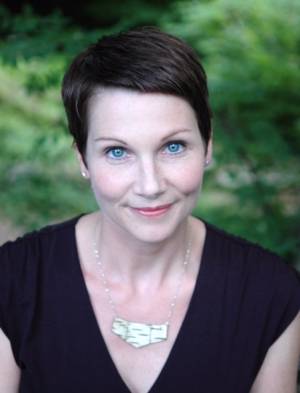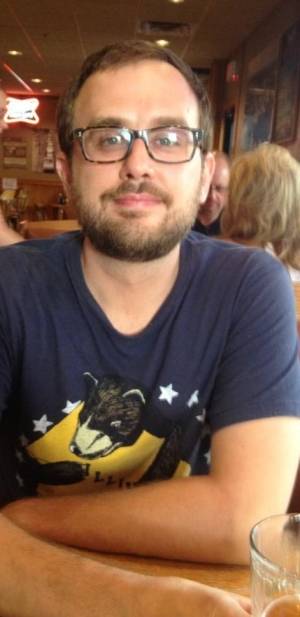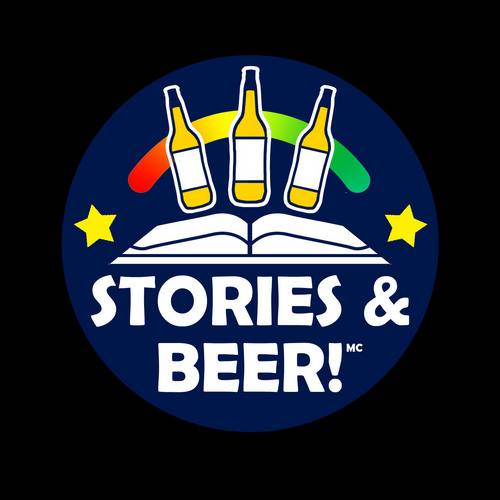On Monday, May 11th, Stories & Beer presents poets Maggie Smith and Sean Karns. The event will take place at 5:30 p.m. at the Bling Pig on Walnut. To warm everyone up for another literary evening, we asked the poets a few questions on craft and confessing.
———
Smile Politely: What was the first thing you remember writing? What drove you to put it on the page?
 Maggie Smith (pictured, right): When I was a child, before I ever wrote a poem (that didn’t happen until I was a teenager), I was known in my family as a listmaker. I was the kid who listed things: favorite colors, things to do, books to read. I came from a long line of listmakers, and my six-year-old daughter seems to be carrying on the tradition. I think of the use of anaphora, syntactical repetition, and patterning in my poems, and even how the poems look on the page, and it makes sense that a listmaker could — over time, and with exposure to literature — become a poet.
Maggie Smith (pictured, right): When I was a child, before I ever wrote a poem (that didn’t happen until I was a teenager), I was known in my family as a listmaker. I was the kid who listed things: favorite colors, things to do, books to read. I came from a long line of listmakers, and my six-year-old daughter seems to be carrying on the tradition. I think of the use of anaphora, syntactical repetition, and patterning in my poems, and even how the poems look on the page, and it makes sense that a listmaker could — over time, and with exposure to literature — become a poet.
Sean Karns: I remember when I was eleven or twelve years old I found my parents’ typewriter in the closet. It was a Smith-Corona; blue, I think. It was probably a late 70s early 80s model. I remember hearing my mom type on that machine during times of unemployment — probably a resume.
I pulled the machine down from the closet shelf, and I placed it on the kitchen table and plugged it in. I think wanted to hear the sound of the machine.
I sat down and typed. I wrote all the greatest clichés: “It was a dark and stormy night/a scary house on the hill” kind of crap. Even then I knew what crap was, and I even knew what self-doubt was at an early age. I was never a confidant boy, still not. So I put the machine back in the closet.
I am still not sure what the drive was or what the drive is now. I suppose life is boring and I need to fill some time.
SP: Do you have any strong non-literary influences?
Smith: I read a lot of poetry, and of course I’m inspired by it, but I also find that my work is heavily influenced by many other things: what I see, hear, and feel as I spend time outside; what I learn by reading about science or history, or by watching NOVA or Nature on PBS; and what my young children do, say, and ask about. Their wonder and curiosity are contagious.
Karns: I have a few. I am big into college sports and probably watch too many movies and shows.
SP: In your opinion, what’s the biggest difference about hearing a poem out loud versus reading it on the page?
Smith: I enjoy hearing poets read their work, but I like to see poems on the page to get a sense of their shapes and to see how they were made. Where are the line breaks? How did the poet employ stanza or punctuation or enjambment? How is white space used?
 Karns (pictured, left): For me there is a big difference. I think that reading and hearing are two different processes. When I hear a poem I am going along with the sound and emotion. When I read a poem I am trying to understand the meaning.
Karns (pictured, left): For me there is a big difference. I think that reading and hearing are two different processes. When I hear a poem I am going along with the sound and emotion. When I read a poem I am trying to understand the meaning.
SP: If you weren’t a poet, what would you do?
Smith: I don’t know how not to be a poet. When I try to imagine erasing that part of myself to see what is left, nothing much is left. I can imagine making a living (by which I mean paying bills) doing plenty of different things, but the poetry would have to stay.
Karns: I think being a writer and movie director would be pretty sweet. I would probably want to direct movies with layered and complex narratives like Paul Thomas Anderson or Wong Kar-wai.
SP: If you had to tell one writer, living or dead, where you hid the body, who would you tell?
Smith: I’m wondering if it would be best to choose a writer I could trust to keep my secret, or a writer who wouldn’t judge me for it, or a writer who might even have a better idea of where to hide a body. I’d tell Catherine Pierce, for at least two of those three reasons.
Karns: I would write my confession on many sheets of paper. And then I would bury my confession in the graves of many dead poets.








